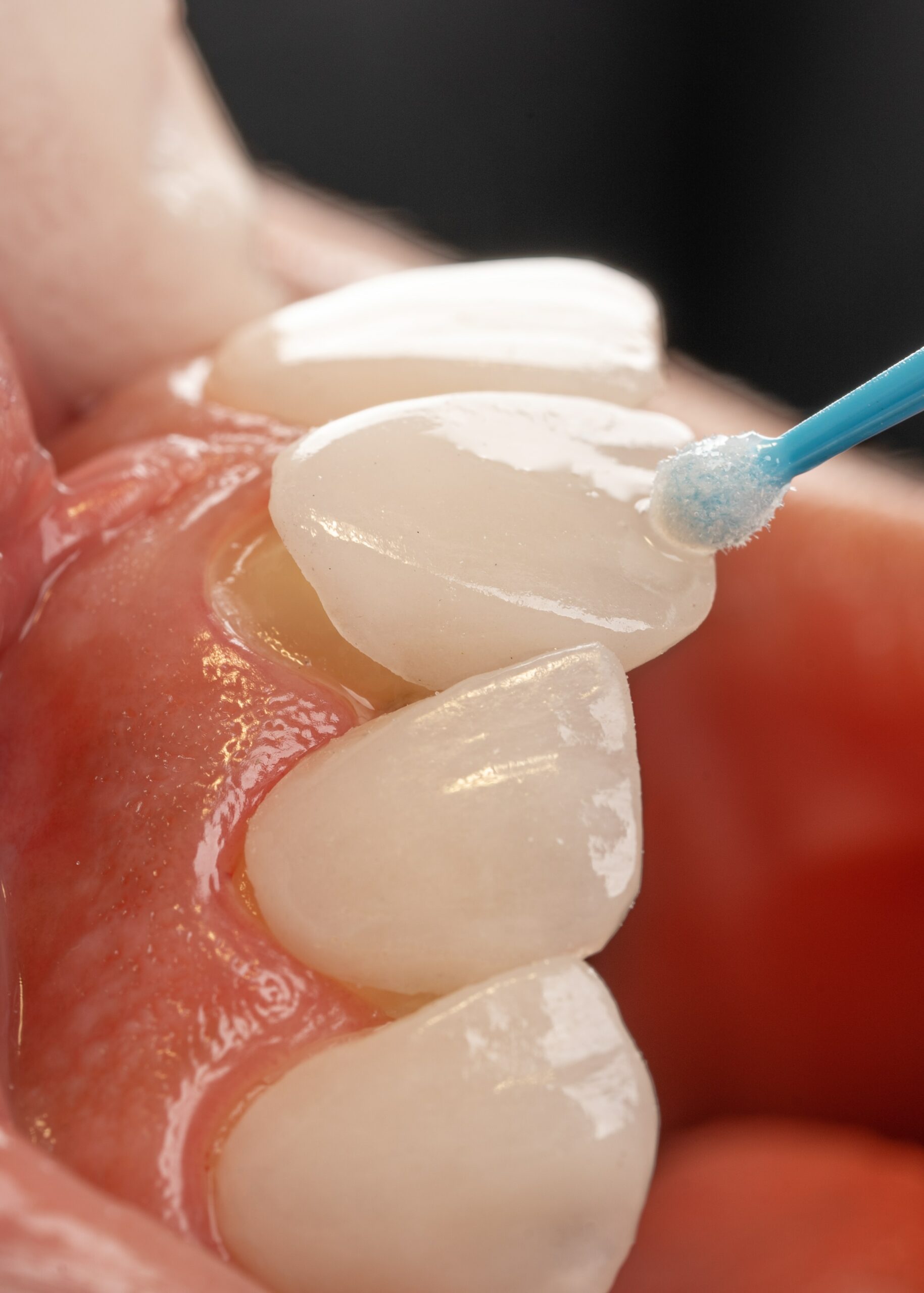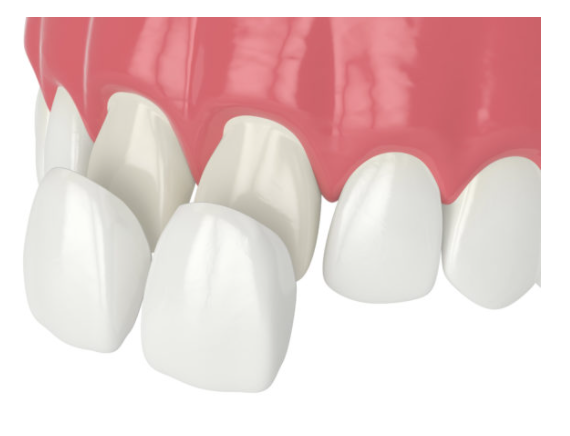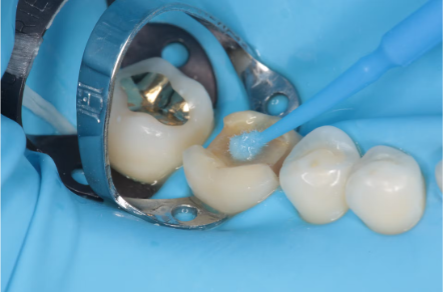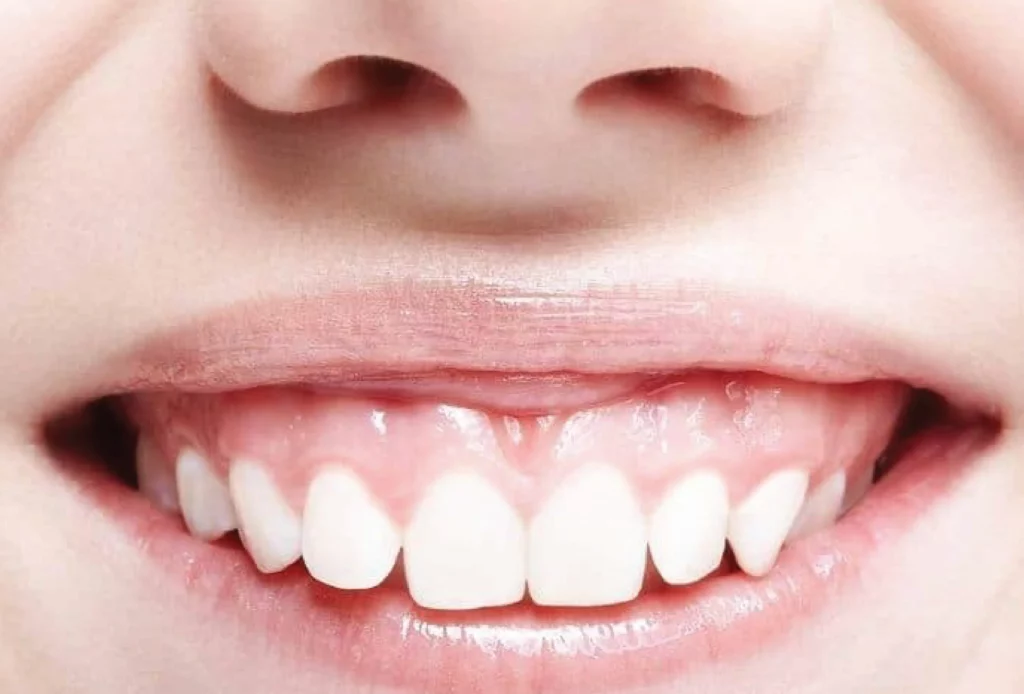Tired of having teeth that look dull or overly stained? Getting dental veneers is one of the quickest and easiest ways to dramatically enhance your smile and brighten your teeth. Here’s everything you need to know about veneers.
What are veneers?
Dental veneers are a thin shell that attach to the front of your teeth and create an improved appearance. Where teeth have become discoloured or overly chipped and damaged, veneers provide a more symmetrical, clean and bright appearance. We customise veneers to reflect the appearance of healthy, natural teeth in colour, and their approximate shape and size.
Veneers are one of many cosmetic dental treatments that help to provide a lasting improvement to teeth aesthetics. When crafted and applied properly, veneers should not be noticeably different from what your natural healthy teeth would look like. Getting veneers gives confidence to people unhappy with the appearance of their teeth, allowing them to smile without anxiety.
How do dental veneers work?
Each dental veneer is roughly 0.5 mm in thickness and attaches to the front of your teeth with a special dental cement. Occasionally we may need to shave some of your existing enamel away to create a more effective bonding surface. Not every tooth will require a veneer. It is possible to only cover teeth that are problematic in appearance, but we recommend having an even number to ensure symmetry.
Dental veneers are more often attached to the upper teeth because they are more visible. However, they can be attached to the lower teeth as well. Veneers are also able to cover teeth that are crooked or have significant spaces between them.
Types of dental veneers
There are different types of veneers, however each veneer procedure achieves similar results. Dental veneers are typically made from porcelain or composite resin, but other materials can be considered depending on patient needs.

Porcelain veneers
Porcelain veneers are the most durable and longest-lasting of all veneer types. They are designed to blend very naturally with the colour of your enamel. The porcelain is also resistant to staining, though still requires regular cleaning and brushing. With these benefits, they are the most popular type, but are also the most expensive with the most invasive process. To attach securely, your dentist often needs to shave some enamel before placing the veneers, which makes the procedure irreversible. However, veneers will last between 10 and 15 years if they are looked after.
Composite veneers
Composite resin veneers are the primary alternative to porcelain veneers, offering a solution that is slightly less strong and more prone to stains, but at a cheaper cost. The resin is made of a mixture of materials — often the same mixture as what is used for dental fillings. Composite veneers closely approximate your natural tooth enamel colour, typically lasting for 5 to 7 years if carefully looked after.
Lumineers
Lumineers are an ultra-thin type of veneers made of porcelain laminate. They require less tooth preparation and shaving before placement while still providing a smooth feel and natural colour. They are less expensive than traditional porcelain veneers but do not last as long, and are more prone to damage.
Who can get veneers?
Veneers cover teeth with significant gaps, noticeable stains or poor colouring, as well as chipped or broken teeth. Other aesthetic issues, including crooked or irregularly-shaped teeth, can also be covered by veneers to create a more uniform smile appearance.
Because veneers are a cosmetic treatment and not a full orthodontic treatment, most people can get them, but it is important to wait until teeth are fully set in their positions. If teeth move after veneers are placed, they may move away from the gum line, creating a poor appearance and opening up the teeth to hygiene issues. We recommend waiting until you are at least 18 before getting veneers.
Do veneers hurt?
One of the benefits of veneers is that the treatment is minimally invasive and less painful than other cosmetic procedures. Some patients will feel tenderness or some gum sensitivity, but it is unlikely this will translate into any significant pain. During the veneers process, your teeth are numbed and you will not be able to feel anything.
Side effects of veneers
While pain is unlikely, you may experience small discomfort after having your veneers placed. Your teeth may feel a little bulky as you adapt to the new feeling. You may also experience some gum swelling, but this should reduce very soon after the process. If you feel pain or symptoms persist from veneer treatment, your dentist will evaluate your teeth and treat any problems.

Dental veneers procedure
Many people want to know the process of veneers. Before getting veneers, your dentist will examine your teeth to evaluate how many veneers you might need, and whether you need any other treatment first. Once you have agreed on the number and type, your dentist will begin preparing by shaving away a thin layer of enamel and then taking a mould of your teeth. This mould is used to create your custom made shells, which typically takes between one to two weeks.
Once the veneers have arrived, your dentist will clean your teeth thoroughly to remove any plaque or bacteria and ensure nothing gets trapped behind the veneers. Then they will apply a special dental cement to each tooth that will have a veneer. Using a UV light, they will harden the cement and accelerate the bonding process with each veneer.
How long do veneers last?
Unfortunately, veneers are not permanent. Their durability will depend on two key factors: the type of material, and how well you look after them. As we’ve noted, porcelain veneers have the most durability, while composite veneers need to be replaced sooner. Over time, any type of veneers will need to be replaced as the gums pull back and expose more room between the veneer and tooth root, or as they weaken with the pressure of daily use.
Regular brushing and cleaning of your veneers will ensure they avoid staining and can last longer before requiring a replacement. Composite veneers are more prone to staining than porcelain, so they may require a quicker update. Thorough cleaning and maintenance should maximise the lifespan of your veneers.
Veneers aftercare
Despite what some may claim, veneers do not improve the appearance of your teeth for good. Veneers still require a high level of oral hygiene and cleaning to maintain their shine and keep stain-free. This includes brushing twice a day and making sure you floss at least once a day to remove any plaque or bacteria build up. In addition, patients still need to attend their regular dental check-up every six months so their dentist can keep track of their overall oral health, while also checking that the veneers are still securely placed.
Beyond standard cleaning, you can prolong the lifespan of your veneers by not chewing on overly hard foods, like raw carrots or corn, and instead chopping them into smaller pieces. Similarly, avoid chewing on hard objects like pens or ice, as this can damage or crack your veneers. If you grind or clench your teeth, look into getting a dental mouthguard or splint to reduce the amount of pressure being placed on your veneers, and also always wear a mouthguard when playing sports.
Considerations
As with any dental treatment, it is important to weigh up the positive and negative attributes of dental veneers before committing to them. Your dentist can help you evaluate all the different aspects and whether they are the right treatment for your teeth.
Advantages
The primary benefit of veneers is how closely they can match the look and colour of your natural teeth. With this, your veneers will not look unnecessarily bright and unrealistic, but will blend seamlessly with your teeth. This consistency in appearance and covering of stains and imperfections can make individuals feel significantly more confident and assured, helping them to smile often and live more freely.
Disadvantages
The main drawback of veneers is the irreversible nature of treatment in most cases, due to the removal of teeth enamel. This removal can also create some sensitivity in your teeth, particularly to overly hot and cold foods or drinks. Getting veneers also requires you to have a healthy mouth — significantly decayed, diseased or crooked teeth will require other treatments first.
How much do veneers cost?
The material used in your veneers combined with how many you have placed on your teeth will determine the cost you pay. An individual veneer can be anywhere between $500 and $2500, with composite resin veneers coming in much cheaper than porcelain veneers. Many dentists will offer a veneers payment plan to help you cover the cost over time, and may offer a discount if you get multiple veneers.
Does health insurance cover veneers?
The cost of dental veneers may be partially covered by many private health funds as part of your overall extras cover, but they are typically not included in basic dental cover. If you are considering veneers, we suggest contacting your health fund directly to find out whether they would be able to partially or fully cover the treatment.
Cosmetic dentistry experts
CDIC is committed to improving the aesthetics and appearance of your teeth through veneers, whitening or any other appropriate treatments. Our team is dedicated and compassionate in their service, and highly-trained in contemporary techniques that restore smiles. To start your own smile transformation, book an obligation-free consultation and we will help you understand whether veneers are the right treatment for your needs. We can’t wait to see your new smile.



